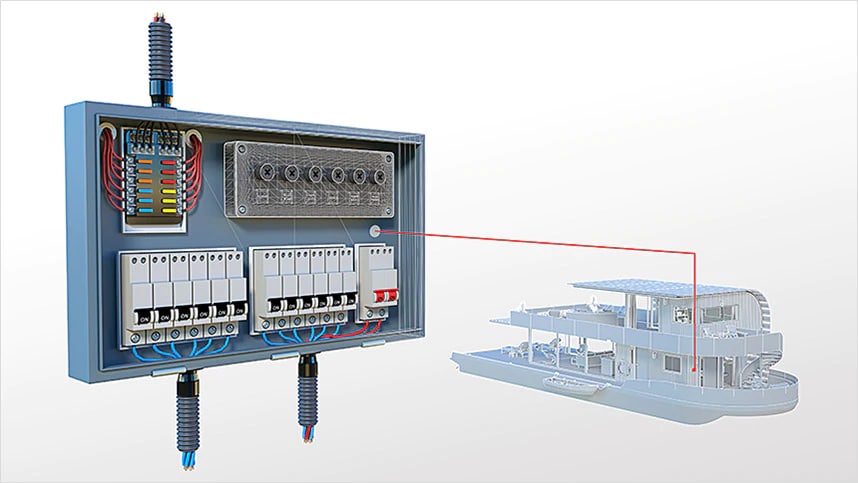Comprehensive Industrial Electrical Design Services to Meet High Power Demands
Comprehensive Industrial Electrical Design Services to Meet High Power Demands
Blog Article
Professional Electric Design Services for Safe and Reliable Equipments
The function of professional electric design solutions is increasingly critical in making sure the safety and security and performance of modern systems that form the foundation of building framework. As we analyze these elements, the impact on future developments in electrical systems warrants careful consideration.
Significance of Electrical Design
Reliable electric design offers as the foundation of a structure's infrastructure, making certain the efficient and risk-free circulation of electrical power. A well-structured electric design contributes to the overall energy efficiency of a facility, which can lead to substantial cost savings over time.
Furthermore, it accommodates the growing need for innovative modern technologies and smart systems that enhance individual experience and operational effectiveness - electrical design services. By incorporating energy-efficient lights, trusted power sources, and suitable circuit formats, electric design facilitates the seamless operation of appliances and machinery important to daily tasks
In addition, detailed electrical design takes into consideration future scalability, permitting for simple upgrades and adjustments as modern technology advances. This forward-thinking approach not only enhances the current system yet additionally protects the investment made in the infrastructure. Essentially, meticulous attention to electric design is indispensable for attaining an effective, sustainable, and risk-free atmosphere in any kind of building or remodelling endeavor.
Trick Components of Design Solutions
A comprehensive electrical design service encompasses a number of essential elements that make certain the trusted and effective execution of electric systems. At the foundation is the analysis of project demands, which consists of understanding client requirements, governing standards, and ecological considerations. This preliminary phase is critical for customizing the design to meet certain demands.
Following, precise lots calculations are carried out to establish the electrical needs of the system. This entails assessing the power needs of all connected devices and making sure that the design can suit potential future growths.
The option of appropriate products and tools is one more important part. This includes choosing top quality elements that abide by market criteria and fit the project's budgetary restrictions.
Furthermore, in-depth schematic representations and layouts are established to picture the system's style, promoting clear interaction amongst stakeholders.
Last but not least, an extensive testimonial and validation process is necessary to make certain that the design fulfills safety standards and operational efficiency before implementation. By integrating these components, electrical design services create robust systems that function properly and securely within their desired environments.
Advantages of Expert Expertise
Engaging specialist expertise in electric design services brings considerable advantages that boost task end results. Primarily, professionals possess extensive expertise of the most up to date tools, technologies, and techniques, ensuring that layouts are not just cutting-edge yet effective and also sensible. Their experience enables for the identification of potential concerns early in the design process, lessening pricey modifications and hold-ups.
In addition, specialist electrical developers are skilled at maximizing system performance while sticking to ideal practices (electrical design services). They utilize sophisticated simulation and modeling techniques to anticipate system actions under different conditions, causing even more trustworthy and efficient designs. This optimization converts to energy savings and boosted operational efficiency, which are critical in today's sustainability-focused setting
Collaboration is another crucial benefit; experienced developers function carefully with various other specialists-- service providers, designers, and designers-- to make certain that all facets of the project line up perfectly. This interdisciplinary technique fosters effective interaction and ultimately causes a practical and natural electric system.
Regulatory Compliance Considerations

Specialists in electrical design need to have a detailed understanding of these guidelines, making sure that all parts fulfill required safety and performance requirements. Routine updates and changes go to this site to policies necessitate recurring education and learning and awareness within the field. Non-compliance can result in pricey delays, redesigns, and lawful consequences, negatively influencing project timelines and spending plans.
Integrating compliance factors to consider from the outset of a project makes it possible for developers to recognize prospective issues early, assisting in smoother approvals and inspections. Engaging experienced electric design solutions guarantees that all regulative criteria are satisfied, thus decreasing threats and promoting a much safer atmosphere for both drivers and customers. Eventually, the emphasis on regulatory compliance cultivates count on and reliability, crucial aspects in the effective distribution of electric design jobs.
Future Fads in Electrical Design

Another arising pattern is the emphasis on renewable resource resources. As the demand for lasting options expands, electric design will significantly include solar, wind, and energy home storage space systems. This shift not just straightens with international sustainability goals but additionally enhances energy resilience.
Additionally, the increase of electric cars (EVs) necessitates a rethinking of electrical framework, motivating layouts that suit EV billing stations in residential and commercial areas. Improvements in energy-efficient parts and products will certainly proceed to play a vital role in reducing power intake and minimizing environmental influence.
Finally, the adoption of electronic twins in electric design permits enhanced simulation and modeling, making it possible for designers to envision and maximize systems prior to implementation. These patterns collectively indicate a transformative change toward much more intelligent, sustainable, and efficient electric design methods.
Final Thought
In final thought, professional electrical design services play a crucial function in making certain the safety and security and performance of building framework. By prioritizing thorough assessments, accurate lots computations, and the use of high-quality materials, these solutions assist in conformity with regulative requirements and minimize threats related to electrical failings. The integration of sustainable methods and advanced modern technologies enhances system efficiency and integrity, inevitably adding to an extra energy-efficient and resilient constructed environment.
The duty of specialist electric design solutions is progressively critical in making sure the safety and efficiency of contemporary systems that form the backbone of structure framework. Efficient electric design offers as the foundation of a structure's infrastructure, guaranteeing the effective and risk-free distribution of electric power.An extensive electric design solution encompasses numerous key elements that make certain the dependable and efficient application of electric systems. Electrical systems must comply with regional, state, and national codes, consisting of the National Electric Code (NEC) in the United States, which establishes the criterion for risk-free electrical design.
As the demand for sustainable options expands, electric design will progressively include solar, wind, residential electrical design and energy storage space systems.
Report this page